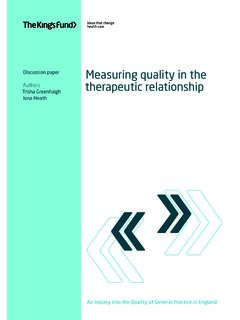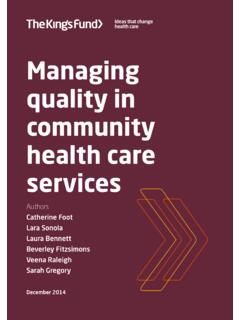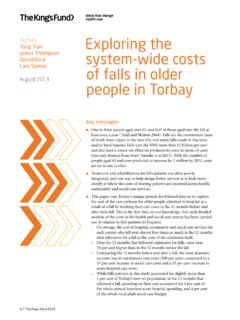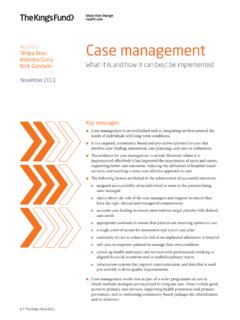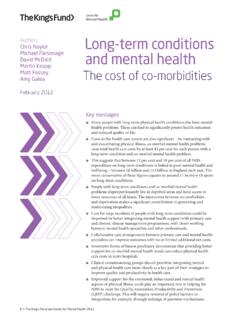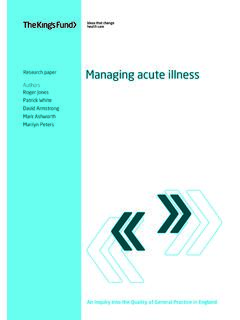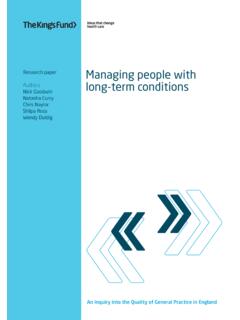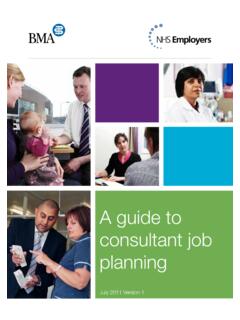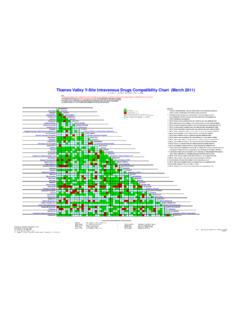Transcription of Making Health Care Systems Fit Ageing Population - King's …
1 Making our Health and care Systems fit for an Ageing populationAuthorsDavid OliverCatherine FootRichard HumphriesPublished byThe King s Fund11 13 Cavendish SquareLondon W1G 0 ANTel: 020 7307 2591 Fax: 020 7307 The King s Fund 2014 First published 2014 by The King s FundCharity registration number: 1126980 All rights reserved, including the right of reproduction in whole or in part in any formISBN: 978 1 909029 27 9A catalogue record for this publication is available from the British LibraryAvailable from:The King s Fund11 13 Cavendish SquareLondon W1G 0 ANTel: 020 7307 2591 Fax: 020 7307 2801 Email: by Kathryn O NeillTypeset by Grasshopper Design CompanyPrinted in the UK by The King s FundThe King s Fund is an independent charity working to improve Health and Health care in England.
2 We help to shape policy and practice through research and analysis; develop individuals, teams and organisations; promote understanding of the Health and social care system; and bring people together to learn, share knowledge and debate. Our vision is that the best possible care is available to ivAbout the authors vKey messages viIntroduction 1 1 Healthy active Ageing and supporting independence 5 2 Helping people to live well with simple or stable long-term
3 Conditions 10 3 Helping people live with complex co-morbidities, including dementia and frailty 15 4 Rapid support close to home in times of crisis 22 5 Good acute hospital care when needed 27 6 Good discharge planning and post-discharge support 33 7 Good rehabilitation and re-ablement (outside acute hospitals)
4 After acute illness or injury 38 8 High-quality, long-term nursing residential care for those who need it 42 9 Choice, control, care and support towards the end of life 48 10 Making it happen integrated care to support older people and their families 54 References 59 The King s Fund 2014iiiContentsThe authors would like to thank Laura Bennett, James Thompson, David Buck and Duncan Hockey for their contributions to the paper.
5 And are also grateful to those who took time to offer insightful comments on earlier drafts, notably colleagues leading services in Greater Manchester, Cornwall and Buckinghamshire and colleagues in The King s Fund Chris Ham, Nicola Walsh and Candace Imison. Particular thanks go to our external reviewers, Professors John Young, Ian Philip and Jon Glasby, Dr Martin Bardsley and Dr David The King s Fund 2014 AcknowledgementsDavid Oliver is a Visiting Fellow at The King s Fund and during his time at the Fund David will work on a variety of integrated care projects, with a particular focus on integrated services for older people. David has been a practising hospital doctor for 25 years and a consultant, specialising in geriatric and general internal medicine, for 16 years.
6 He has been lead clinician and clinical director for both South London NHS trust and the Royal berkshire NHS Foundation David was the government s National Clinical Director for Older People at the Department of Health , was seconded to the Civil Service from 2010 to 2013, and before that was a specialist clinical adviser in the Department of Health . He is a past secretary and current president-elect of the British Geriatrics Society and chair of the Royal College of Physicians Speciality Committee for Geriatric academia, David was a senior lecturer in the School of Health Sciences at the University of Reading from 2004 to 2009. Since 2009 he has been a visiting professor of medicine for older people at City University London.
7 He has a visiting chair at the University of Surrey. He has lectured both in the United Kingdom and Foot joined the policy directorate at The King s Fund in March 2009, and manages a programme of work on patient experience and quality. Her interests include how organisations gather and respond to feedback and information from patients, how patients can be meaningfully involved in and lead service design and improvement, the effectiveness of national structures and Systems for assuring and improving quality and patient experience, and international , she has been programme director of the International Cancer Benchmarking Partnership, a Department of Health -led initiative to study why cancer survival rates vary between countries with similar Health Systems and expenditures on Health , and was head of policy at Cancer Research UK, where she worked on cancer services reform, public Health .
8 Health inequalities and medical science Humphries joined The King s Fund in 2009 to lead on social care and work across the NHS and local government. He is a recognised national commentator and writer on social care reform, the funding of long-term care and the integration of Health and social care. He is leading the Fund s work on Health and wellbeing boards, including a research project and offering practical support to several local authorities and their Health graduate of LSE, his professional background is social work, and over the past 35 years he has worked in a variety of roles, including as a director of social services and Health authority chief executive (the first combined post in England) and in senior roles in the Department of Health .
9 Richard is a columnist for the Local Government Chronicle, a non-executive director of Housing21 and co-chair of the associates network of the Association of Directors of Adult Social Services. He is also a Fellow of the the authors The King s Fund 2014vImproving services for older people requires us to consider each component of care, since many older people use multiple services, and the quality, capacity and responsiveness of any one component will affect others. The key components we have set out in this paper are: n healthy, active Ageing and supporting independencen living well with simple or stable long-term conditionsn living well with complex co-morbidities, dementia and frailtyn rapid support close to home in times of crisisn good acute hospital care when neededn good discharge planning and post-discharge supportn good rehabilitation and re-ablement after acute illness or injuryn high-quality nursing and residential care for those who need itn choice, control and support towards the end of lifen integration to provide person-centred co-ordinated each component, we present evidence and guidance for how to provide high-quality care.
10 With examples of local innovations. Key issues include the use of comprehensive geriatric assessment at the right time, and the effective provision of co-ordinated primary, community and social care services close to Transforming services for older people requires a fundamental shift towards care that is co-ordinated around the full range of an individual s needs (rather than care based around single diseases) and care that truly prioritises prevention and support for maintaining independence. Achieving this will require much more integrated working to ensure that the right mix of services is available in the right place at the right Incremental, marginal change is not sufficient; change is needed at scale and at pace.

